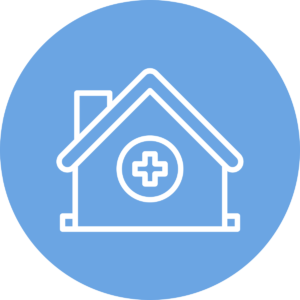Orange County
Residential Treatment
Center for Mental
Health
The Path To Sound Mind, Body and Soul
Did you know that nearly 53 million American adults are currently living with a mental health condition? So if you have been struggling with mental illness you are not alone.
Unfortunately, a huge number of people living with mental health issues do not feel able to get the support they need to manage their condition. This can have a big impact on their emotional wellbeing, financial stability, and personal relationships.
If you find that your mental health is impacting any aspect of your life, help is at hand. There are currently more than 9,000 mental health residential treatment organizations with centers across the United States. So how does a mental health residential treatment center different from outpatient support?

What Is Mental Health Residential Treatment?
A residential mental health treatment involves staying at an expert mental health center. During your treatment you will live alongside other patients. You will also have access to a range of support from specialist doctors and therapists.
Each center focuses on giving you the time and space to focus on your mental health recovery, away from daily life. So who is this treatment suitable for? Let’s take a look.
What Conditions Can A Residential Mental Health Treatment Facility Help With?
When it comes to treating mental health, no two patients are exactly the same. Because of this, our residential treatment program is equipped to support patients who are battling:
- Anxiety
- Depression
- Post-traumatic stress disorder (PTSD)
- Mood disorders
- Bipolar disorder
- Personality disorders
At Acera Health, we believe in treating the whole individual. So, we can also accommodate addiction treatment through our dual diagnosis program. Also known as co-occurring disorders, dual diagnosis is when a substance abuse issue and mental health issue overlap. At our Orange County treatment centers, we are more than willing to work with you and your loved ones through addiction recovery.
In the case that our experts find themselves unable to handle the substance abuse problem, we will work with you and your loved one to find an appropriate alcohol and drug rehab center with an appropriate addiction treatment program.
What Are the Benefits of Residential Mental Health Treatment?
So why is residential treatment a popular option for people living with mental health conditions in the US? Let’s take a closer look at some of the benefits of residential treatment for mental illness.
Treatment Centers Give You Time and Space
A lot of people seek help for mental illness once their condition has progressed. At this stage it can have a big impact on your daily life. This can make managing every day tasks overwhelming.
Residential treatment centers give you the time and space to focus on managing your mental health away from daily life. They can also help you escape triggering environments.
Range of Treatment Options
Each center can offer a range of treatment options, so you are sure to find one that suits you. These include:
- Cognitive behavioral therapy (CBT)
- Medication-assisted treatment and medication management
- Dialectical behavioral therapy (DBT)
- Support groups for family and friends
- Individual therapy sessions
- Group therapy
Around-the-Clock Care
In certain cases, your mental health condition may become a threat to your safety. Or it might make looking after yourself very challenging. In that case, 24/7 professional care is an extremely valuable resource.
Post-Treatment Transition
Once you have finished your stay at a residential center, the staff will help you transition back into your daily life. They might invite you to come to outpatient support groups. And they can help you stay in touch with other residents who understand your experiences.
What Should You Look for in a Residential Treatment Center?
It is very important that you find a treatment center that you feel comfortable with. This includes the facility, staff, program, and more. This ensures you have access to the resources you need and offers you the best chance of successfully managing your mental illness.

Variety of Treatment Options
A range of treatment options means that you will have the opportunity to find what works best for you. It is a good idea to ask which treatments are on offer before choosing a center. That way you can make sure you’ll have access to the treatment you’re looking for.
Patient-Centered Treatment Plans
Mental illness affects each person differently. Because of this, it is important that a residential center treats each resident and not just their diagnosis. They should ask about your symptoms and how your illness is affecting your life to find a treatment that will work for you.
Experienced and Collaborative Staff
A center’s staff are its biggest resource so you should always check them out. You want a range of doctors, nurses, psychiatrists, holistic practitioners, and dieticians.
Each member of staff should be prepared to work together to support your recovery. They should focus on how to support you as an individual and listen to your needs.
A Sense of Community
Speaking of working together, one of the best things about residential centers is their sense of community. So make sure you look out for this. Mental illnesses can be extremely isolating, so living with people who really understand your experiences can make a huge difference.
Because of this, make sure you look for a center that promotes group therapies and offers a range of extracurricular activities. That way you will have the opportunity to bond with the other residents when you are ready to.
Get Support Improving Your Mental Health Today
As you can see, there are lots of benefits to getting support from a mental health residential treatment center. These centers give you the time, space, and professional support to understand and improve how you manage your mental health.
Our mental health treatment facilies here in Southern California can handle all ranges of mental health recovery. From residential inpatient treatment, to outpatient treatment, to our intensive outpatient program, we’re willing to work with you every step of the way.
Are you ready to get support for your mental health? Then get in touch with Acera Health in Orange County today to speak to a member of our team — we’re here to help.

Reach Out Today
To learn more about if Acera Health is right for you, and what to expect, contact us Today!
"*" indicates required fields
3100 Bristol St. Suite # 250 Costa Mesa, CA 92626
info@acerahealth.com
DHCS license number: MHBT220400
DHCS license expiration date: July 20, 2024
DSS license number: 306006131 & 306006072



